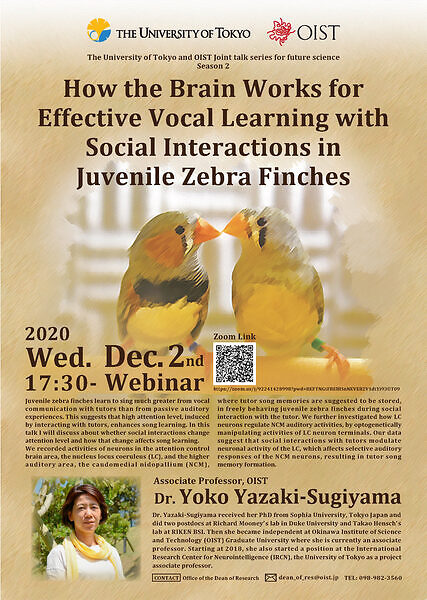How the Brain Works for Effective Vocal Learning with Social Interactions in Juvenile Zebra Finches

Date
Location
Description
Title:
How the Brain Works for Effective Vocal Learning with Social Interactions in Juvenile Zebra Finches
Abstract:
Juvenile zebra finches learn to sing much greater from vocal communication with tutors than from passive auditory experiences. This suggests that high attention level, induced by interacting with tutors, enhances song learning. In this talk I will discuss about whether social interactions change attention level and how that change affects song learning.
We recorded activities of neurons in the attention control brain area, the nucleus locus coeruleus (LC), and the higher auditory area, the caudomedial nidopallium (NCM), where tutor song memories are suggested to be stored, in freely behaving juvenile zebra finches during social interaction with the tutor. We further investigated how LC neurons regulate NCM auditory activities, by optogenetically manipulating activities of LC neuron terminals. Our data suggest that social interactions with tutors modulate neuronal activity of the LC, which affects selective auditory responses of the NCM neurons, resulting in tutor song memory formation.
Speaker:
Dr. Yoko Yazaki-Sugiyama, Associate Professor, OIST
Profile:
Dr. Yazaki-Sugiyama received her PhD from Sophia University, Tokyo Japan and did two postdocs at Richard Mooney’s lab in Duke University and Takao Hensch’s lab at RIKEN BSI. Then she became independent at Okinawa Institute of Science and Technology (OIST) Graduate University where she is currently an associate professor. Starting at 2018, she also started a position at the International Research Center for Neurointelligence (IRCN), the University of Tokyo as a project associate professor.
Zoom:
- https://zoom.us/j/92241428998?pwd=REFTNGtFRElHSnNEVE82V1dtYi93UT09
- Meeting ID: 922 4142 8998
- Passcode: 910123
Subscribe to the OIST Calendar: Right-click to download, then open in your calendar application.



